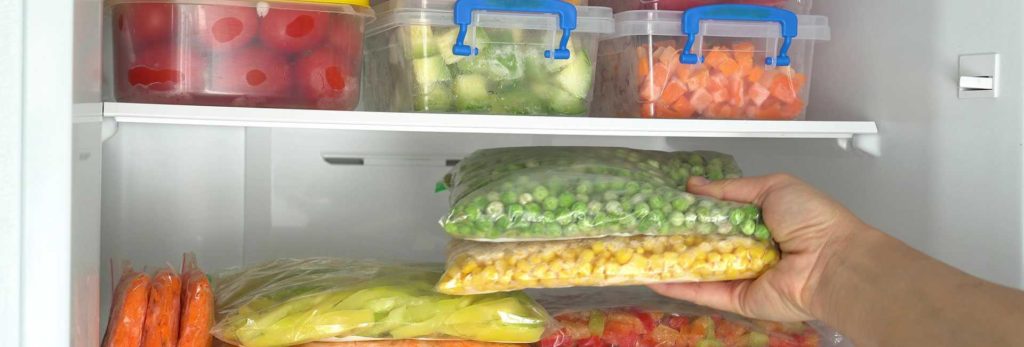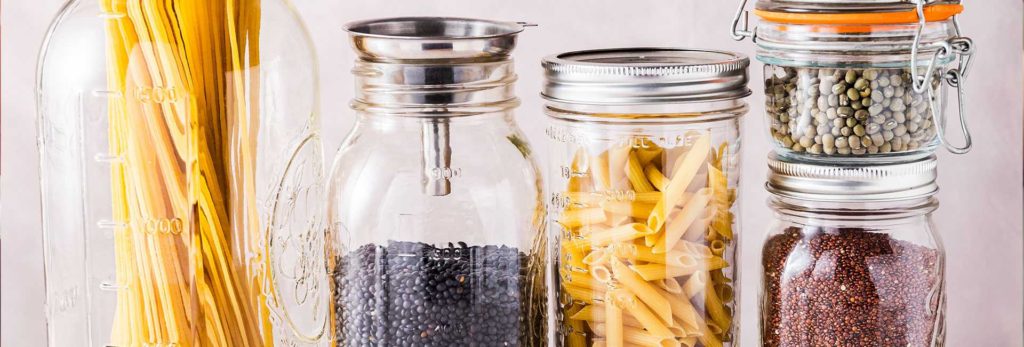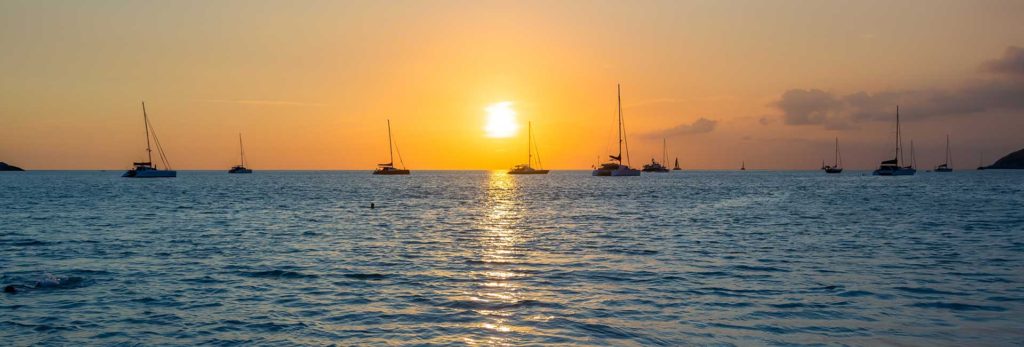Quick Links
- Boat Food Tip 1 | Planning
- Boat Food Tip 2 | Cook Beforehand
- Boat Food Tip 3 | Freeze Food
- Boat Food Tip 4 | Fishing
- Boat Food Tip 5 | Stock Up Correctly
- Boat Food Tip 6 | Recipes Are Important
- Boat Food | Parting Tips
So you’re prepping for a sailing trip and, congratulations, the food and kitchen (or should that be galley?) department is all yours! No pressure, friends, and no worries either, if you take our 6 Top Boat Food Tips on board.
We know wrapping your head around the topic of sailing food and cooking on a boat (not to mention everything that goes with provisioning a vessel with sufficient water and food supplies) can seem a bit overwhelming – especially the first time around.
What can you cook on a sailboat? What foods will stay fresh the longest? What dishes can be conjured up quickly during a passage? How do you make sure everyone on your boat stays well-fed, properly hydrated and, most importantly, healthy?
These are just some of the questions you may ask as you prepare for your epic cruise on your Knysna 500SE or 550 luxury catamaran.
If you’d like to discover the sailing food secrets every ocean adventurer should be in on, keep reading for our 6 Top Boat Food Tips.
Boat Food Tip 1 | Planning
Ever heard the saying “planning is everything”? It might be a cliché, but it definitely applies to boat food.
Planning your meals, food supplies, and everything related to them in advance, will require you to consider several important questions before setting out on your voyage.
For example, who will be in charge of cooking and food prep? Will one person handle all food-related tasks on the boat, or will everyone take turns according to a predetermined schedule?
Before you go food shopping for your voyage, you’ll want to take as many factors into account as possible. This includes the duration of your cruise; the number of passengers on your boat; as well the various food preferences, sensitivities and nutritional requirements of your fellow voyagers.
Will there be any vegans or vegetarians on the voyage? Does everyone drink alcohol? Eat red meat? Sugar? Wheat? Dairy? These are all important questions to know the answers to before you even set foot in a grocery store (of which there will be none, possibly for weeks at a time, once you lift anchor).
Once you’ve gathered all the necessary information, you can start planning your boating meals by day.
For example, if your passage is an estimated 15 days, you might consider making 8 frozen meals in advance, and taking the ingredients for another 10 meals (yes, 3 extra meals, just in case) along.
Of course, all of the above will depend on the amount of onboard fridge, freezer and storage space you have available.
If you have lots of freezer space on your boat, it makes sense to load in lots of pre-cooked meals. If your boat’s cold storage space is limited, you might want to take more dry and non-perishable foods along on your journey.
Once you’re off on your voyage, you’ll have very restricted access to shops for stocking up on food supplies and your internet access (for emergency meal planning) will most likely be intermittent as well.
Luckily, there’s so much information on food provisioning and meal planning for a sailing trip available online. The only catch? You need to do this research well in advance of your sailing adventure.
We’ll say it again. When it comes to food provisioning for your cruise, planning really is everything.
Take planning a step further & visit Knysna Yacht Company for a custom-built catamaran, designed according to your specific needs and preferences.

Boat Food Tip 2 | Cook Beforehand
Have we mentioned planning yet?
Another part of crucial, pre-voyage meal planning includes cooking and prepping as much food as possible before you lift anchor.
Cooking full meals (such as soups, stews and pies) while you still have access to grocery stores, unlimited water supplies, fully kitted-out kitchens, and vacuum sealers just makes sense, no?
These pre-cooked, vacuum-packed meals can then be frozen to be defrosted and reheated before serving on board. You can also create meal kits in advance, where raw ingredients are packaged together, frozen and then cooked underway.
To save yourself a lot of potential frustration and frantic “it’s-got-to-be-here-somewhere” scrambles around your boat, consider also creating a spreadsheet document with information on the locations of all your prepped meals, ingredients and other food items on board.

Boat Food Tip 3 | Freeze Food
Some foods (like meat, cheese, berries and nuts) freeze really well. Others, not so much.
You’d do well to investigate which is which well ahead of your journey. Again, the internet is your friend when it comes to finding out this vital information.
After a long day of sailing, having fully or half-cooked frozen ingredients at the ready can save you a lot of time and effort.

Boat Food Tip 4 | Fishing
Think of the ocean as your limitless storage facility for all things pescatarian.
If you and your passengers enjoy seafood, you’d be wise to make provision for catching, cleaning and consuming plenty of it during your voyage.
Hooking and eating fresh fare directly from the ocean isn’t just fun and free. You’ll also be feasting on food that is organic, free-range, and super nutritious. All you need to do is ensure you have everything at hand for quick and effective catching and cleaning. This would entail fishing rods, tackle, a bucket, a filleting knife and a cutting board.
Even if you’re squeamish about catching your own meals, you won’t regret keeping the bucket, filleting knife and cutting board at hand.
You’ll have plenty of opportunities to buy freshly caught fish and other types of seafood from local vendors in ports and on beaches wherever you drop anchor. For the most part, this seafood will still require cleaning and prepping before cooking.

Boat Food Tip 5 | Stock Up Correctly
While out at sea, having a boat stocked with essential, non-perishable foods is crucial.
Think uncooked pasta, rice, maize and wheat flour, oil and dried legumes, to name just a few types of foods. Don’t forget about good old sugar, salt and spices, either. These are all foods that will last a very long time when properly sealed and stored on your yacht.
Do the necessary research and make sure that you’re well-stocked on non-perishable foods that will last the duration of your journey. Portioned, vacuum-sealed, dry soup mixes are great for whipping up quick and nutritious meals when fresh ingredients are in short supply.
Also, keep in mind that you can always complement dry ingredients with fresh produce bought from local markets along your way.

Boat Food Tip 6 | Recipes Are Important
To combat boredom, you may be looking forward to lots of cooking while on passage. Or you may be devising plans to spend as little time below-deck cooking as possible. Everyone is different, and your preference will dictate your cooking style.
However, setting out on your voyage armed with a selection of tried-and-tested recipes is never a bad idea.
On Allrecipes.com, you can search for recipes by entering ingredients, making it an excellent resource for getting meal suggestions around the food supplies you are taking along on your voyage.
Here are some Allrecipes.com recipe suggestions for cooking with lentils, pasta and rice to get you started. You can also have a look here for some tasty sailing food inspiration from fellow ocean adventurers!
Boat Food | Parting Tips
When preparing for an extended ocean voyage, we know there’s a boatload of planning to do. One critical area never to skimp on is the food and water department.
A few more useful boat food tips would include:
Asking every passenger to bring their own drinking cup with a closable lid. This will eliminate the need for disposable water bottles, cutting down on the amount of plastic waste you generate on your journey. It will also encourage each passenger to take charge of their own hydration requirements.
Using large, oversized food bowls at mealtime. This will prevent food from spilling out of plates when seas get rough.
Keeping lots of paper towels handy on your journey. Trust us. You can never have enough paper towels while out at sea.
Packing extra canned and dried foods as a precautionary measure. An ocean voyage can easily run over its scheduled time. Make sure you provide for such a scenario by packing extra food supplies.
Having at least one alternative cooking and cooling device at hand. Ovens and fridges pack up all the time. When this happens at sea, it can be disastrous. Having a small gas burner and a large coolbox (or something similar) as backups is essential.
Lastly, before you embark, do as much online research as possible. Read up on how other ocean adventurers provisioned their boats and planned (and executed) their meals during their trip.
We also suggest that you customise your yacht with an interior perfect for on-water cooking. Visit Knysna Yacht Company for a personalised luxury catamaran.
When it comes to boat food, forewarned is definitely forearmed.
Happy planning, bon voyage and bon appétit!

